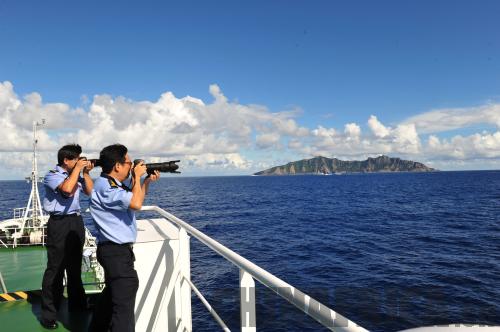|
 |
|
FOCUSING IN: A Chinese surveillance ship patrols Diaoyu Islands waters on September 14 (ZHANG JIANSONG) |
This year marks the 40th anniversary of the normalization of diplomatic relations between China and Japan; but it has turned out to be the coldest year in bilateral relations between the two countries since the World War II.
Both countries have had numerous protests against each other; many planned celebrations were cancelled; commercial links were severed and high-level exchanges suspended.
The turning point in the souring of relations is over the much disputed Diaoyu Islands (Fishing Islands literally), a group of uninhabited small islands in the East China Sea, which both China and Japan claim sovereignty over. On September 10, Japan's Yoshihiko Noda's administration announced it would "purchase" some of the Diaoyu Islands from their "owner," ignoring the strong opposition from the Chinese Government. This move also aroused fierce protests in China.
As a countermeasure, the Chinese Government announced specific boundaries related to the territorial waters of Diaoyu Islands. Based on this, the Chinese Government sends its surveillance ships and fishery administration ships to the waters on a regular basis.
"Undoubtedly, the Diaoyu Islands belong to China no matter historically or legally," Xu Guangyu, Member of the Board of China Arms Control and Disarmament Association, told ChinAfrica. "This is widely recognized by the international community. I believe Yoshihiko Noda [Japanese Prime Minister] also knows the fact though he denies it repeatedly."
Back to negotiations
A report released by the U.S. Congressional Research Service on September 25 said Washington has never recognized Japan's sovereignty over the Diaoyu Islands and takes no position over the territorial row between Japan and China. It claims the United States recognizes only Japan's administrative power over the Diaoyu Islands after the Okinawa Reversion Treaty was signed in 1971.
For a long term, China and Japan kept the principle of "setting aside dispute and pursuing joint development" put forward by late Chinese leader Deng Xiaoping, until the recent move by the Japanese Government of the so-called "purchase" of the islands.
"Before the so-called 'purchase' of the lands, China showed great restraint over the issue," said Liu Yongjiang, Deputy Director of Institute of Modern International Relations of Tsinghua University in an interview with China Central Television.
Starting mid-September, China's surveillance ships and fishery administration ships have been frequently seen close to the Diaoyu Islands. Since October 1, the ships have been sailing in the waters almost daily. "This phenomenon was rarely seen in the past," said Liu.
According to Liu, when the Japanese Government "nationalized" the Diaoyu Islands, China needn't abide by the principle of "setting aside dispute and pursuing joint development," and that's why China can so frequently send surveillance ships and fishery administration ships to the islands, because China does not need to consider it disputable, said Liu.
"China has set routine the patrols on the waters, and maybe later will do that permanently [if this problem cannot be solved through negotiations]," said Liu.
China's bottom line is clear. "Japan should face reality, acknowledge the dispute, correct its mistakes and come back to a solution to the issue through negotiations," Foreign Ministry spokesman Hong Lei told a regular news conference on October 10.
|